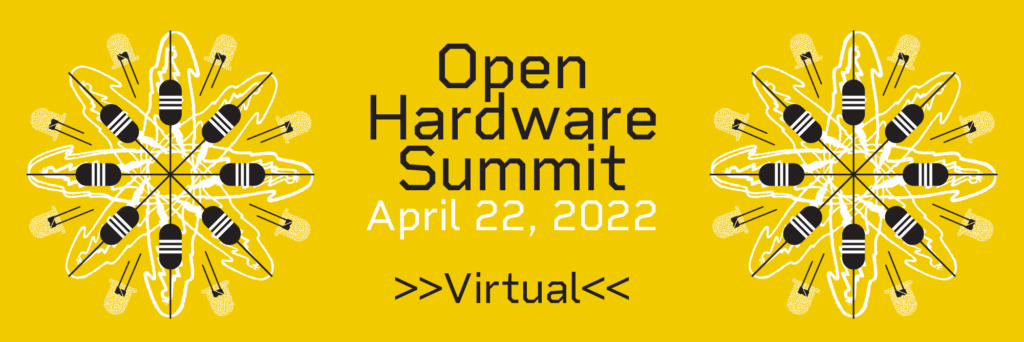
All the talks from the the 2022 Open Hardware Summit are now online:
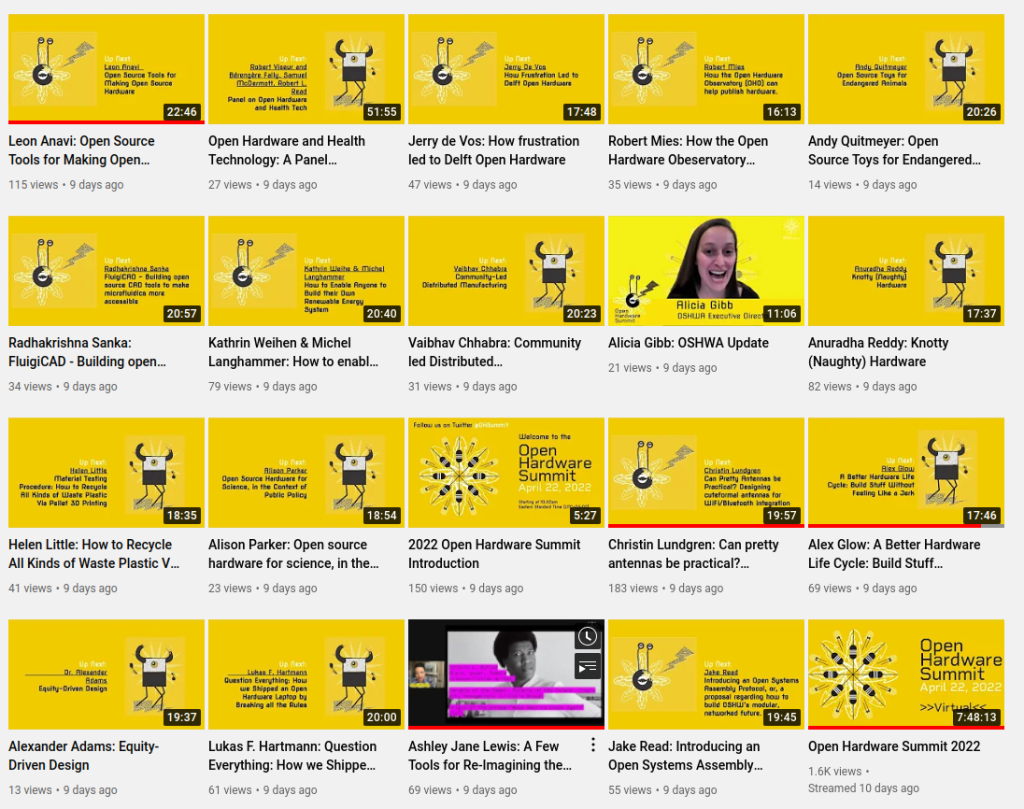

Tune in to the 2022 Open Hardware Summit live stream:
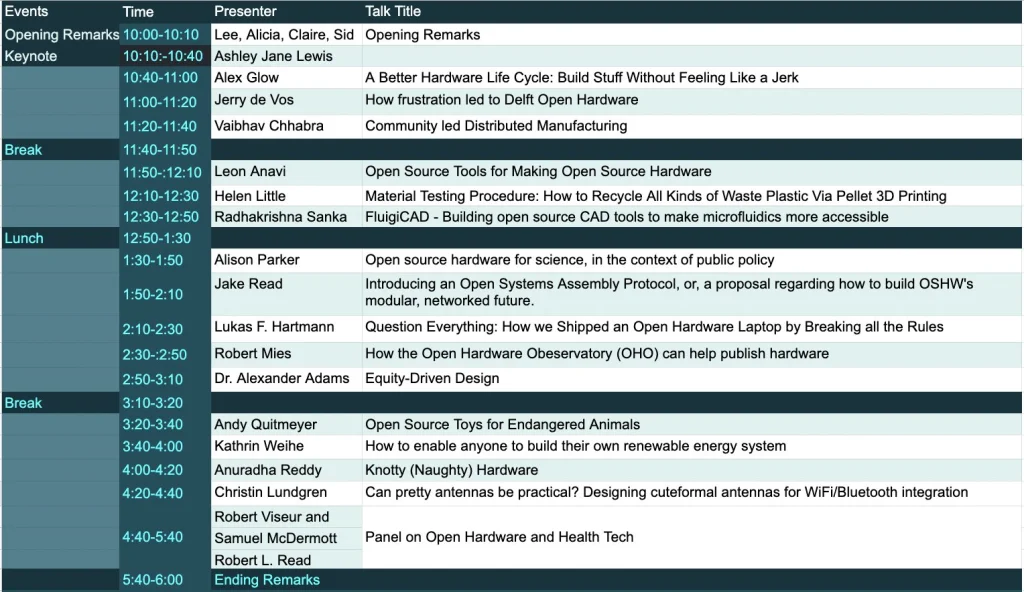
The summit is available on YouTube for free, but buying a ticket helps support OSH year-round! We have PWYC, Standard, and Goodie Bag tickets, as well as free RSVP tickets.
The Open Hardware Summit is the annual conference organized by the Open Source Hardware Association a 501(c)(3) not for profit charity. It is the world’s first comprehensive conference on open hardware; a venue and community in which we discuss and draw attention to the rapidly growing Open Source Hardware movement.
Speakers include world renowned leaders from industry, academia, the arts and maker community. Talks cover a wide range of subjects from electronics, mechanics to related fields such as digital fabrication, fashion technology, self-quantification devices, and IP law. As a microcosm of the Open Source Hardware community, the Summit provides an annual friendly forum for the community. For over five years we have had an established fellowship which supports travel and admission for women and other minorities as well as hardship tickets for low income individuals. The Open Hardware Summit was founded in 2010 by Alicia Gibb and Ayah Bdeir with support from Peter Semmelhack and Bug Labs in its founding years. Read more about the history of the organization and feel free to contact us with any questions.

The 2021 Open Hardware Summit starts tomorrow, Friday, April 9th, at 10:00 EDT / 14:00 UTC
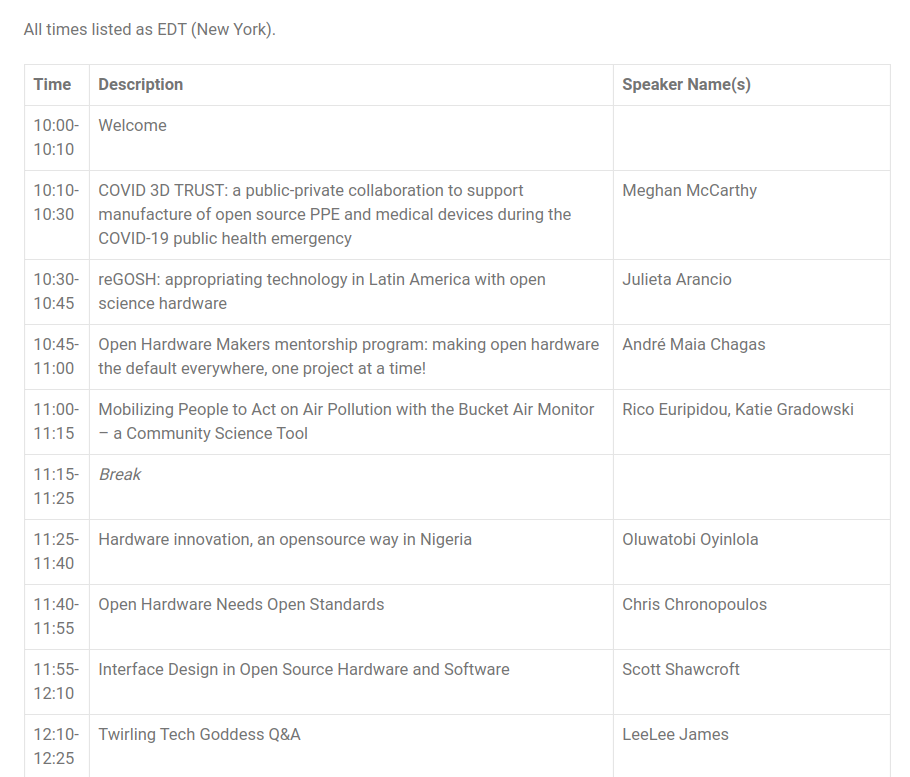
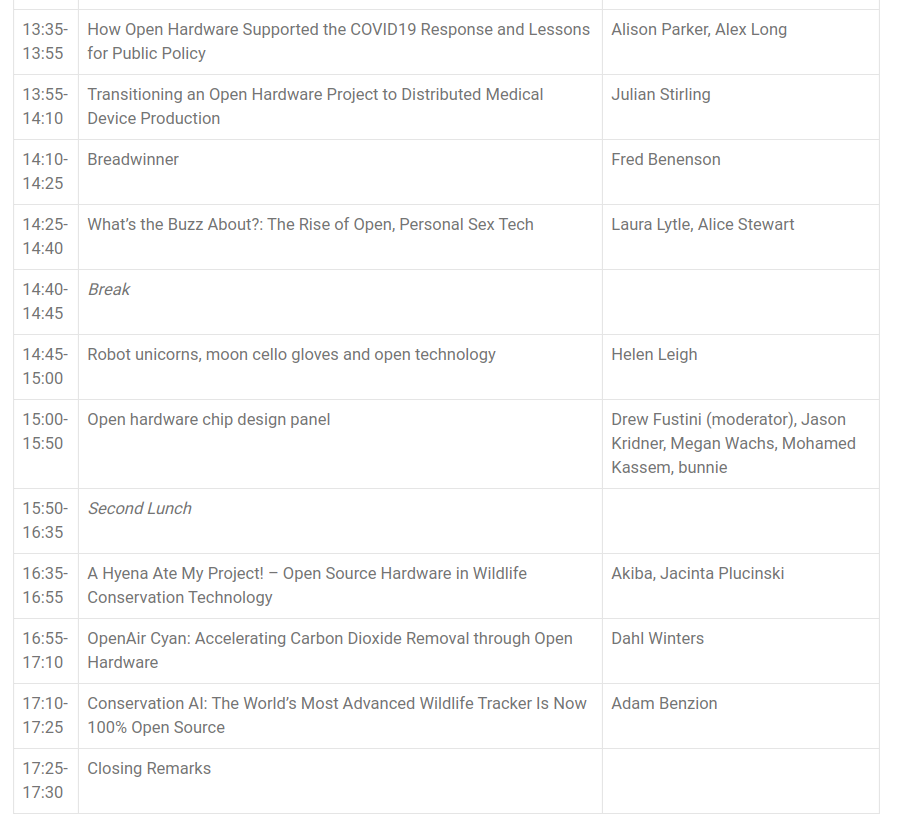
Tickets are still available starting at $20
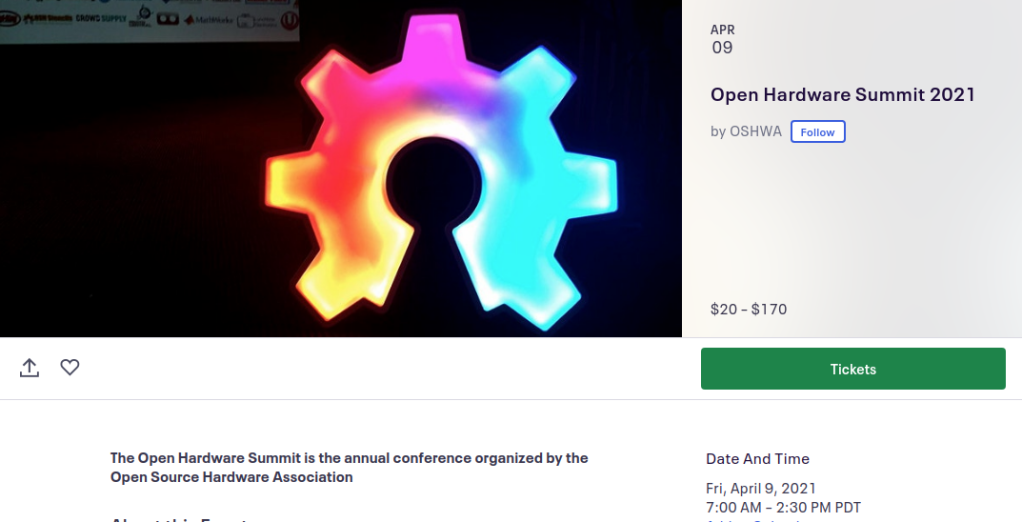
News from the Open Hardware Summit coming up in April:

Open Hardware Summit (Edition 11), Call for Proposals
Link to Apply: https://forms.gle/RNXUfWaZBpohdq5Y6
The Open Hardware Summit (OHS) invites talk proposals for the eleventh annual summit! This year’s summit is virtual and will be held online on Friday 2021-04-09, 9:00 AM – 5:30 PM EDT.
The Open Hardware Summit is for presenting, discussing, and learning about open hardware of all kinds. The summit examines open hardware applications, practices, and theory, ranging from environmental sensors to 3D printable medical devices to open hardware processors and beyond. We are interested in open hardware on its own as well as in relation to topics such as software, design, business, law, and education. Past talks have featured topics such as advances in space propulsion, humanitarian projects, right to repair legislation, open hardware in education, and open hardware marketing.
For our eleventh edition we are especially looking for speakers who can offer insights around the role of open hardware in the COVID-19 pandemic, open hardware medical devices, and related topics.
We invite talk proposals from individuals and groups. Submissions are due by Thursday 2021-02-11 at 11 PM EDT.
Anool from Wyolum has published an exciting blog post about 3D renders:
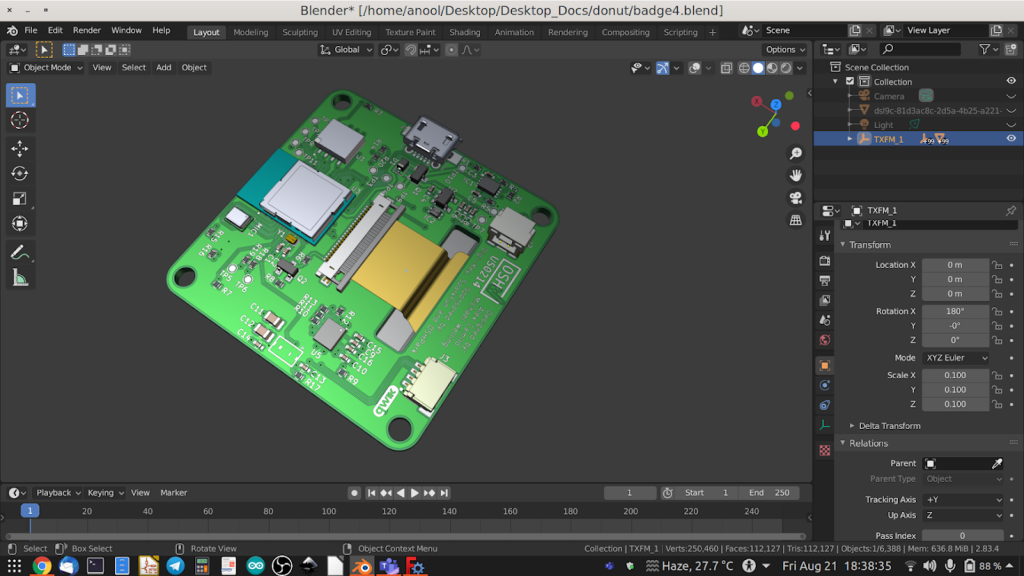
Experimenting PCB rendering using KiCad, FreeCAD and Blender
I’ve been putting off using Blender since over 5 years, being intimidated by the complex UI and workflow, until this month when I mustered courage to go through Andrew Price’s Doughnut tutorials. My aim was to learn how to do photo-realistic renders of KiCad boards.
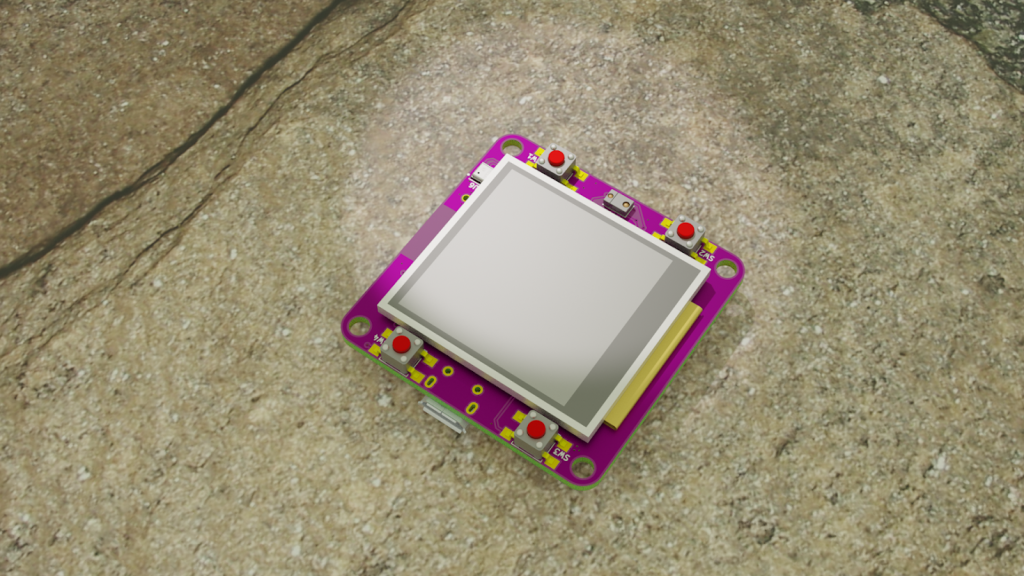
From OSHWA president Michael Weinberg:
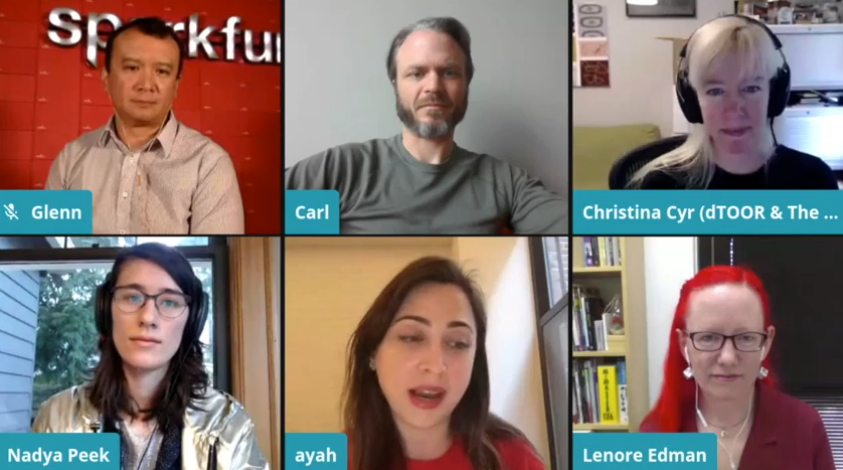
How We Made the Open Hardware Summit All Virtual in Less Than a Week
First, thank you again to everyone – speakers, participants, and sponsors – for a fantastic 10th anniversary Open Hardware Summit. We knew the 10th anniversary Summit would be one for the ages, although we didn’t quite expect it to be because it became the first virtual Summit.
Thanks to the timing of the Summit, the 10th anniversary Summit ended up being many people’s first virtual summit of the Covid-19 era (that includes the organizers). Unfortunately it looks like it is unlikely to be the last. In the hopes of helping event organizers struggling with the same challenges, this blog post outlines the decisions we made and the steps we took to make it happen.
Quick Context
The Open Hardware Summit is an annual gathering of the open source hardware community held by the Open Source Hardware Association (OSHWA). This year OSHWA partnered with the Engelberg Center on Innovation Law & Policy at NYU Law to host the event in New York City. The event usually brings together hundreds of community members and speakers from around the world. It was scheduled for March 13, 2020.
While the situation has been evolving for some time, as recently as March 5th (8 days before the Summit) we thought that holding a reduced in-person version of the event was the right decision. By March 8 (5 days before the Summit) that was no longer tenable and we announced that the Summit was going all virtual. That was the right decision, but what does going all virtual mean?
Priorities
We had two major priorities for the virtual Summit:
- Online streaming video of all of the speakers and panels.
- A community space for discussions and coming together.
Video
The live stream of the Summit had to be both accessible to our viewers and easy to join for our speakers and panelists. After considering some options and consulting with experts in our community (huge thank you to Phil Torrone at Adafruit for the guidance), we concluded that a combination of YouTube and StreamYard would be the best option.
YouTube worked for our community because it is easily accessible on a wide range of platforms in most of the world. That meant that just about everyone would be able to see the Summit from wherever they were.
StreamYard made it easy to manage the backend. Speakers could join a virtual green room before their talk and our technical testing the day before the Summit made it clear that it was easy for them to share their slide presentations as well. One of the members of the Summit team was able to easily add and remove people (and their screens) to the live feed, along with stills and slides for introductions, sponsors, and everything else.
Community Space
We also looked at a number of options for online discussions. We decided that a discord server would be the best option for the open source hardware community. Discord allowed us to open the space to anyone who wanted to join, while at the same time giving us moderation control over the discussion (huge thank you for Lenore Edman from Evil Mad Scientist Laboratories for jumping in as a moderator). Many community members were already comfortable with discord, which was also a bonus.
We also decided to use discord for a version of Q&A for the speakers. One option would have been to try and integrate video questions from the audience into the live stream. That would have been technically possible with StreamYard (probably…), but it seemed like an unnecessary logistical complication for the organizers. As an alternative we decided to set up separate discord channels for each of the speakers. That allowed the speakers to end their talk and move to their discord channel for further discussions.
One unexpected and welcome development was that the discord server grew into a larger community hub, with channels devoted to solutions to Covid-19, community announcements, hacking the conference badge, and even virtual conference tips. We may decide to maintain the server well beyond the Summit as a community space.
It Mostly Worked
We scheduled brief runthroughs with all of the speakers the day before the Summit. Everyone had a chance to get comfortable with the process and work out any last minute problems. On the day of the Summit we embedded the livestream in the Summit site, along with a link to the discord server for discussion. There were a few audio glitches where speakers had to briefly drop out, but all things considered it went pretty smoothly.
Once the Summit was over the entire livestream of the Summit was posted automatically to OSHWA’s YouTube channel. Within a day or two we had broken out all of the individual talks into a video playlist and pulled the audio from our panel discussion into a stand alone podcast episode.
To the extent that things worked, one of the big reasons was the nature of the OSHWA community. Besides being generally great and supportive (no small thing), the open source hardware community already sees itself as a community and is already comfortable with connecting via online tools. That made it easy for them to enthusiastically watch the live stream and jump into the online discussion. Not all types of events have this starting point, which may suggest that they are not great candidates for this type of virtual structure.
If you are reading this because you are working on your own virtual event, good luck! We are happy to answer questions if you have them. Email us at [email protected]. StreamYard also has a referral program, so if you drop us a line at [email protected] we can give you a $10 credit if you want it.
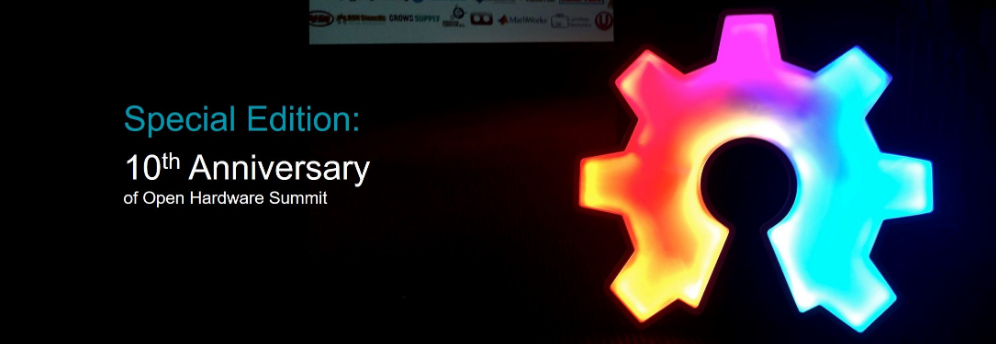
The virtual Open Hardware Summit starts today at 10:00am US EDT, this is 5 hours behind Central European Time (CET):
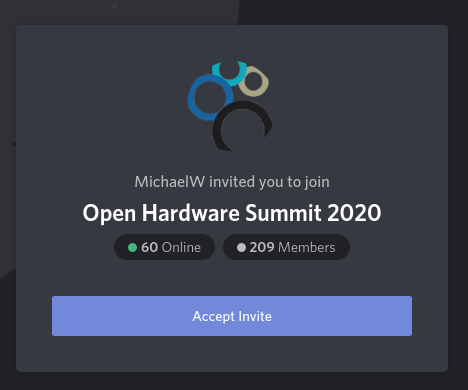
Due to the COVID-19 virus, the Open Hardware Summit has been moved from NYC to cyberspace!